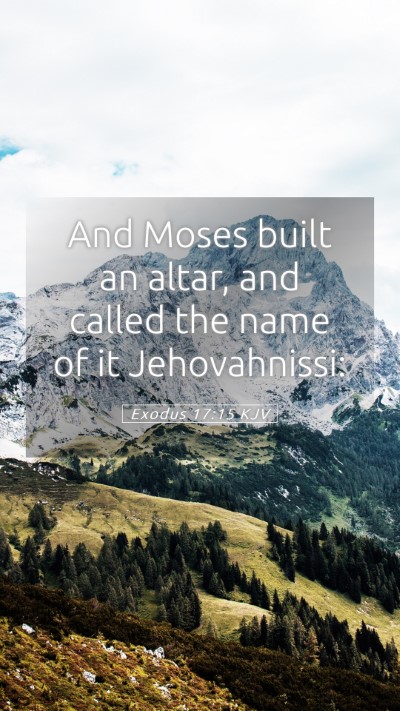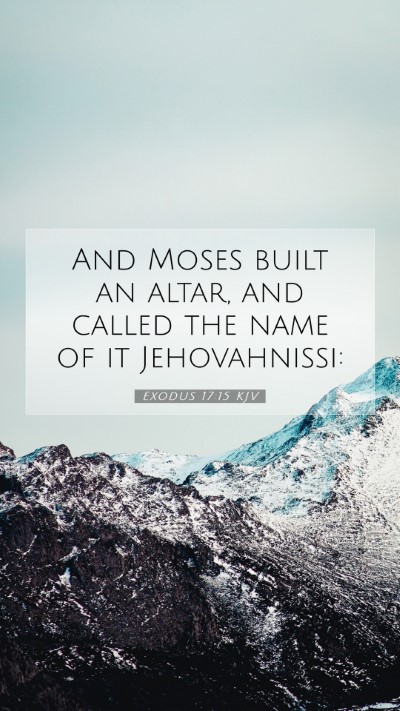Understanding Exodus 17:15
In Exodus 17:15, we find a pivotal moment in the journey of the Israelites through the desert, reflecting themes of victory, divine assistance, and the importance of legacy. The verse states:
"And Moses built an altar, and called the name of it Jehovahnissi."
Bible Verse Meanings
This verse captures a foundational moment of worship and acknowledgment of God's deliverance. Let's explore the deeper meanings expressed in the commentaries of Matthew Henry, Albert Barnes, and Adam Clarke.
Bible Verse Interpretations
-
Matthew Henry's Commentary:
Henry emphasizes that Moses' building of an altar signifies a response to God's miraculous aid. The name "Jehovahnissi," meaning "The Lord is my banner," indicates a recognition of God as the source of victory. This act of worship serves as a memorial for future generations, reminding them to trust in God's providence in times of battle.
-
Albert Barnes' Notes:
Barnes provides further insight into the historical context, explaining that the altar serves not just for worship but as a marker of God's faithfulness. By naming the altar "Jehovahnissi," it signifies the people's reliance on God's power in conflict, highlighting the importance of remembering divine intervention in their history.
-
Adam Clarke's Commentary:
Clarke adds a layer of personal application, explaining that building altars symbolically represents our personal acknowledgments of God's past help. The act invites believers to reflect on their own lives where God has been their support, encouraging them to establish their own 'altars'—moments of worship and gratitude.
Insights on Biblical Exegesis
The significance of Exodus 17:15 extends beyond its immediate context. The act of building an altar signifies:
- Worship and Acknowledgment: An intentional act of worship recognizing divine assistance.
- Historical Remembrance: A tangible reminder of God's intervention in the struggles of His people.
- Community Identity: Reinforcing communal identity through shared moments of faith and trust in God.
Scripture Analysis
This verse encourages Bible study groups to explore the intersection of worship, community, and remembrance in their sessions. Engaging with this text can facilitate thoughtful discussions about how the past informs our faith today.
Application of Bible Verses to Daily Life
In applying the lessons of Exodus 17:15, consider the following:
- Reflect on personal 'altars' in your life where you have experienced God’s support.
- In times of challenge, look back at your own victories and the divine assistance you received.
- Share stories of God's faithfulness in your life with your community, reinforcing collective trust in Him.
Cross References
For further study, consider these related verses that emphasize similar themes of trust and divine assistance:
- Deuteronomy 25:17-19 - Remembrance of Amalek's defeat.
- Psalm 60:4 - God as a banner for His people.
- 1 Samuel 30:6 - David strengthening himself in the Lord.
Conclusion
Exodus 17:15 serves as a rich narrative of God's steadfast love and provides theological and practical insights for believers today. Understanding this scripture emphasizes the importance of remembrance, worship, and the acknowledgment of God's support throughout our lives.
Bible Study Tools and Resources
To deepen your understanding of this and other scripture, consider utilizing these resources:
- Bible study guides available online.
- Interactive online Bible study courses.
- Discussion materials for Bible study groups.
Engaging with the Bible through commentary and study tools can enrich your understanding of scripture, making the lessons of Exodus 17:15 applicable to modern life.


